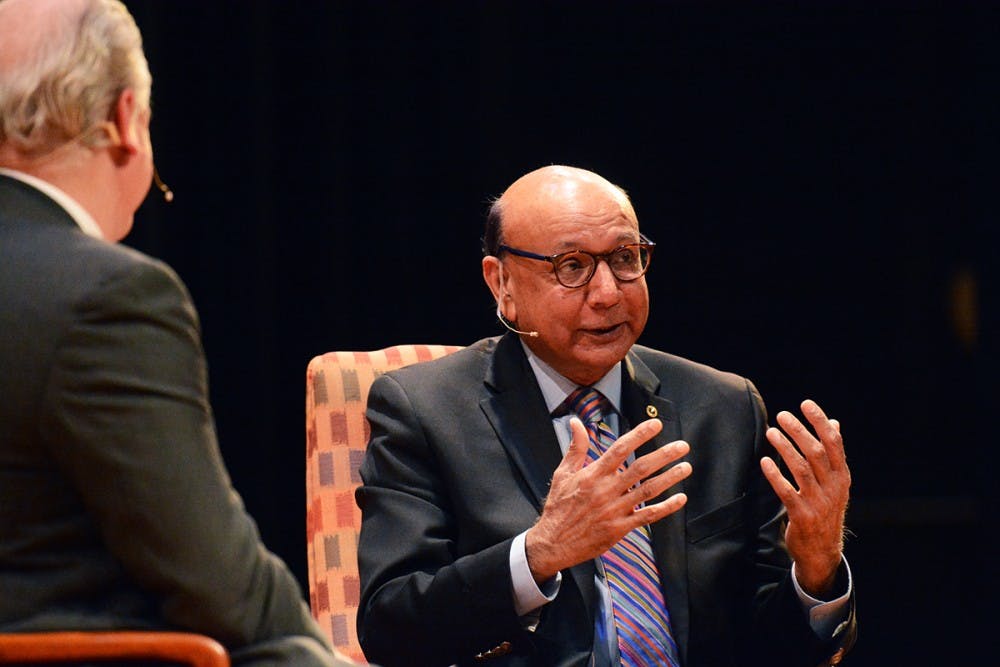Khizr Khan, the father of late Army Capt. Humayun Khan, spoke to a crowd of several hundred at Charlottesville High School Thursday as part of the Virginia Festival of the Book. In an event titled “Hope and Sacrifice,” Khan discussed his recently released books “An American Family” and “This is Our Constitution.” The first book describes Khan’s journey as an immigrant to the U.S. and his family’s story, while the second is aimed at educating middle schoolers about the the U.S. Constitution.
Douglas Blackmon, director of Public Programs for the Miller Center, moderated the event and asked Khan about his literary works during the 90-minute event, but their discussion covered much more — Khan told the story of how he’d dreamed of becoming a U.S. citizen since he first read the Constitution in his 20s in Pakistan, sharing an inspiring optimism about the power of democracy and his thoughts on the importance of political action in the Trump era.
Blackmon introduced Khan as a man who needed little introduction, citing his past notable speeches. Khan spoke at the Democratic National Convention in 2016 to advocate for rights of immigrants and Muslims. He also discussed his son’s service in the United States military and the respect that should be given to those who are killed in action, like Humayun, regardless of their cultural background or religion.
“People were glued to this man and this voice,” Blackmon said of Khan’s speech at the Democratic National Convention. “This was going to be one of the most remarkable voices I would hear in my life.”
Early in the presentation, Khan described “An American Family” as “the story of all immigrants who come to this blessed land.”
Since he first read the Constitution and the Declaration of Independence as a young student, he said he recognized its unique importance.
“It meant something really special, something you struggle for,” Khan said. “I read [the Declaration of Independence] ... standing, my feet were hurting, but I could not stop reading.”
Khan’s appreciation for the inalienable rights the Constitution guarantees continued to shine through as he told Blackmon how immigrants view the U.S. as a symbol of freedom.
“There is a reason why the U.S. … remains a beacon of hope for the world,” he said. “At the core of our hearts is the appreciation of human dignity.”
Khan said his second book, written for middle school students, is designed to help young Americans get acquainted with their government and the rights it guarantees them.
Even in what he called “dark times,” Khan maintained an unwavering faith in the power of democratic deliberations and respectful political dialogue to safely guide the country.
“It’s the salient feature of democracy … to be respectful, to be civil,” Khan said. “We must continue to speak out and preserve our values. These rights are inalienable, but they are not self-executory, which means we must stand up for them, we must defend them.”
When asked what amendment should be added to the Constitution, Khan said “that amendment would be that every citizen of the United States must read … the Constitution of the United States” in order to understand “the goodness of the dignities given to us.”
He went on to describe the 2016 election as an anomaly that had caused many Americans to “become reacquainted with our Constitution.” He spoke of being encouraged by long lines at the polls for midterm elections and emphasized the importance of voting as the way to push for change.
“Virginia has decided that we will not have this nonsense,” Khan said. “We will take our destiny back into our own hands.”
In the final minutes of the event, Blackmon brought up Capt. Humayun Khan, Khizr Khan’s son and a 2000 College graduate who died serving in the Army in Iraq. After participating in the Army ROTC program at the University, Khan was killed by a car bombing in 2004 and was posthumously awarded the Bronze Star and Purple Heart medals. The University honored Capt. Khan in 2017 with a memorial plaque on the Rotunda which reads, “He stands in the unbroken line of patriots who dared to die that freedom might live.”
Khan told the story of his son’s decision to join ROTC as a student, inspired by the disciplined, driven Army ROTC members he knew from his classes.
“What parent would decline based on that argument?” Khan said. “We expressed concerns, but he convinced us.”
Khan described how his son stopped a civilian car approaching his guard post and refrained from firing in fear of hurting innocents. Instead, he approached the car alone and was killed protecting his fellow soldiers. Some of Khan’s parting words to the audience were of emotional gratitude, thanking the University for its role in his son’s life.
“We are blessed to have such souls,” he said. “He was made right here on the sacred Grounds of U.Va.”
After the discussion, Khan signed books for audience members in the main hall.
“There is a palpable energy in the room,” said Julie Brisky, a graduate student in the College and a former member of the University Navy ROTC program. “[I am] blown away by how much he is a beacon of light reminding us … about respect and dignity.”
Part of the proceeds from the purchase of the “This is Our Constitution” and “An American Family” will go directly to the fund for the Capt. Humayun Khan Memorial Scholarship, annually awarding $10,000 to a student in need who is either in the ROTC or majoring in a field that studies the U.S. Constitution.







